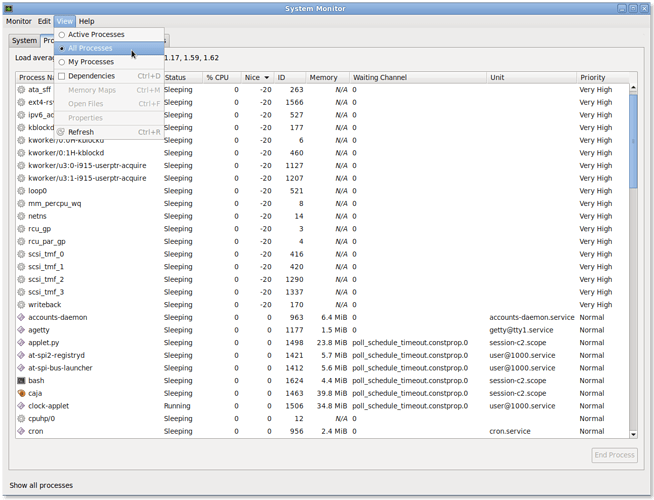I have the CPU Frequency Scaling Monitor in my Panel, and lately it varies wildly even when the computer is at idle and offline. It seems to coincide with the occasional blink of a light on the PC's front panel (disk activity light I assume). The value for CPU0 briefly jumps from the low 20% range to 97% at times, or to other brief readings in the 60s, 70s or 80s. CPU1-5 jump too, but usually not as high. Not every jump coincides with a blink, but often they're just before or after one. My worry of course is that there's ransomware encrypting my HDD.
When I launch System Monitor from my Panel right now in the Processes tab and pause from typing, it doesn't show anything that coincides with the jumps, with nothing spiking above 4% CPU. The only apps with noticeable frequent activity are mate-system-monitor (0-4%), and lightdm/xorg (0-4% usually less), and it's rare to see anything else rise above 0%. A few others will occasionally flash quickly from Sleeping to Running but those don't seem to coincide with CPU jumps either. The apps Resources tab shows frequent jumps to 20% on most cores but seldom more than one at a time. None of the cores rose above 38% in the minutes I watched. Maybe when several cores rise above their resting >10% level it triggers the CPU speed high anticipating a load? Memory & Swap History
is a flat line at 19%.
System: Dell desktop - Release 20.04.3 LTS (Focal Fossa) 64-bit - Kernel Linux 5.4.0-89-generic x86_64 - Kernel Linux 5.4.0-89-generic x86_64 - 11.5 GiB - Intel® Core™ i5-9400 CPU @ 2.90GHz×6 - Mesa Intel® UHD Graphics 630 (CFL GT2) - Available disk space: 1.1 TB (128GB nvme and two 5TB Seagate ST5000L HDDs, one removed from the USB3 case and on the internal SATA the other on a USB3 port).
Usually there are some processes with negative Nice numbers at -20 or Very High Priority. Right now there's only PulseAudio -10 and VeryHigh Priority. Hopefully that doesn't mean it's done encrypting and I'll soon get an ugly email. 
Anyway, is this normal and if not - any ideas/suggestions?

 The rest of this post looks at things from a very pessimistic, paranoid perspective, and you should only consider heeding this advice if you are truly concerned about malware on your system.
The rest of this post looks at things from a very pessimistic, paranoid perspective, and you should only consider heeding this advice if you are truly concerned about malware on your system.